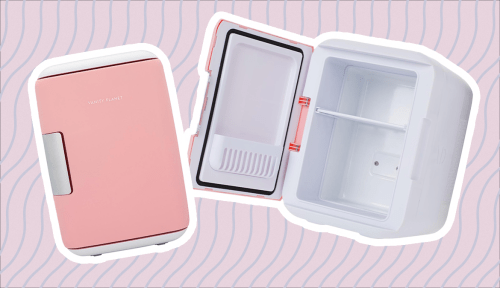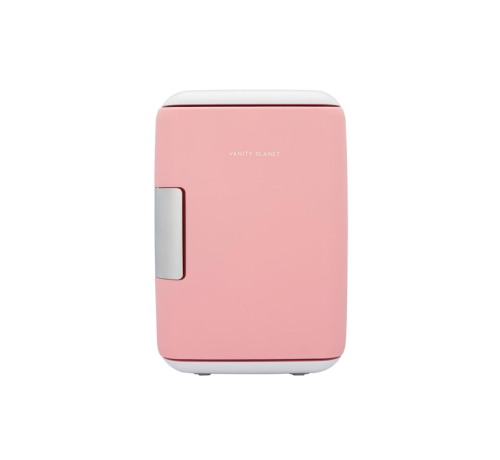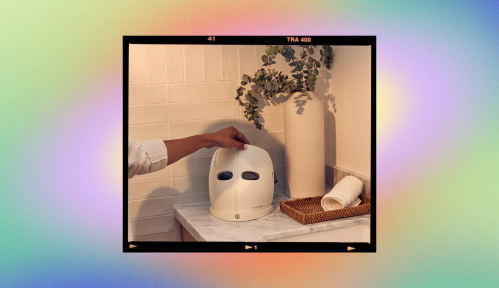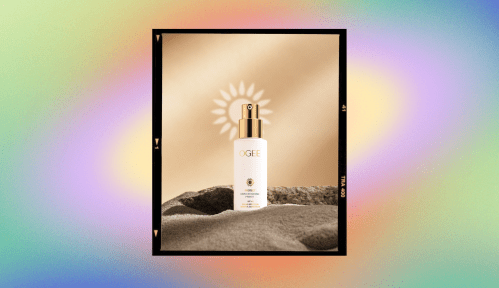Our editors independently select these products. Making a purchase through our links may earn Well+Good a commission
‘I’m a Dermatologist, and Here’s Why You Need a Skin-Care Fridge—And What To Stock in It’
Always wondered what the deal is with a skin-care fridge? Here's why a dermatologist recommends grabbing one, and how to stock it.

On first thought, the idea of a “skin-care fridge” might seem like one of those passing trends that has no real function beyond looking aesthetically pleasing on your social media feeds.
But, board-certified dermatologist Hadley King, MD, FAAD, says there are real benefits to owning a skin-care fridge (besides looking cute in your bathroom, of course)—like this adorable pink Vanity Planet one that has customizable shelves and a convenient door panel to store all your favorite products.

Vanity Planet Outlines Skincare Fridge — $65.00
Pros:
- Can prolong shelf life of some skin-care products
- Cools down skin-care products and tools, which can make them feel more soothing
- Adjustable shelves can be customized to fit the products you use
Cons:
- Too small to fit a large number of products
“There are some [skin-care product] formulations that have relatively short shelf lives, and for some of them, refrigeration can help prolong the life,” Dr. King says. “Ingredients that fall under the ‘short shelf life’ category include vitamin C, retinol, probiotics, and some combinations of benzoyl peroxide.”
Dr. King also notes that any products that don’t contain preservatives (which can be true for products labeled “clean” or “natural”) should be refrigerated in order to extend their lifespan.
“Any skin-care product that claims to be soothing, cooling, or anti-inflammatory may be more soothing and cooling if stored in a refrigerator,” Dr. King says. “For example, cooling face masks and anti-itch lotions with menthol may feel more soothing if they are cooled.” After a long day, a cool face mask pulled straight from your mini-fridge will be *just* what you and your skin need to chill out (pun intended).
Dr. King also recommends storing skin-care tools, such as jade rollers and eye patches, in a skin-care fridge. “When chilled, they can offer a cooling and soothing sensation and constrict blood vessels, which can decrease puffiness and redness,” she says. Using a cooled jade roller in the morning will help you and your skin to wake up and shake off any early morning puffiness.
Similarly, any eye creams or gels that are meant to reduce puffiness can be more effective if you store them in the fridge, thanks to that extra punch of cold your under-eyes will get when they’re applied, Dr. King says.
In general, it’s always important to check the back of your skin-care products for the expiration date, as it ranges from product to product, especially when it comes to vitamin C and retinol formulas—which can have unstable molecules—and probiotics, which contain living bacteria, Dr. King says. A skin-care fridge may be able to stretch out how long these products will be beneficial for your skin, though, so you won’t have to buy a new bottle as soon as it hits the expiration date.
“If you notice that the product color is shifting toward brown, you should stop using it and throw it away,” Dr. King says, so you’ll know when to throw away any products you store in your skin-care fridge.
Interestingly enough, different kinds of packaging can also make a significant difference in some types of products’ shelf lives, Dr. King says. For example, retinol in a tube or airless pump will last longer than ones in a jar that become exposed to the air.
“If you like these kinds of products and you use them a lot,…then a mini fridge can be great,” Dr. King says. Consider this permission to hop in on the trend—and take the shelfie for your feed.
Sign up for the Well+Good SHOP Newsletter
Get exclusive deals on wellness, beauty, fitness, and food products that have been hand-picked by our editors.
Got it, you've been added to our email list.










